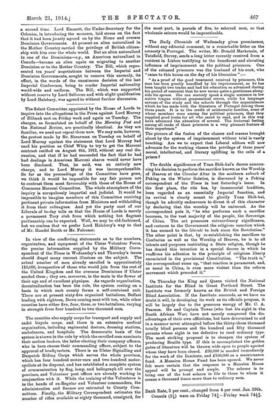The double significance of Yuan Shih-kars decree announ- cing his
decision to perform the sacrifice known as the Worship of Heaven at the Circular Altar in the southern suburb of Peking on the Winter Solstice, is discussed by a Peking correspondent of the Times in last Saturday's issue. In the first place, the rite has, by immemorial tradition, been regarded as an essentially Imperial function, and its revival is clearly meant to glorify Yuan Shih-kai, though he adroitly endeavours to divest it of this character by declaring that the worship will be universal. As the correspondent pats it, "he who performs such a sacrifice becomes, to the vast majority of the people, the Sovereign of China. The act possesses extraordinary significance, and restores to the Government the religious sanction which it has seemed to the literati to lack since the Revolution." The other point is that, by re-establishing the sacrifices to Confucius as well as the Worship of Heaven, he is to all intents and purposes instituting a State religion, though he has denied this intention in a special decree in which he reaffirms his adhesion to the principle of religious liberty enunciated in the provisional Constitution. " The truth is," the correspondent sums up, "that reaction is paramount, and, as usual in China, is even more violent than the reform movement which preceded it."










































 Previous page
Previous page